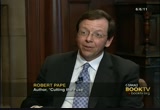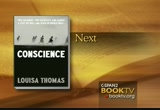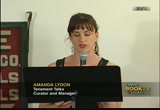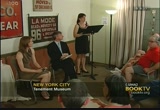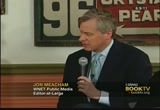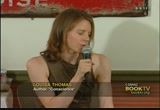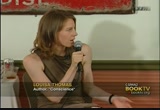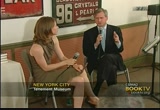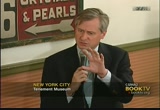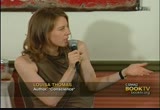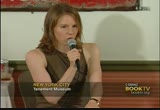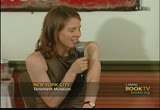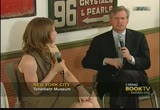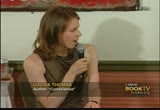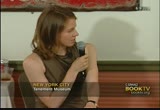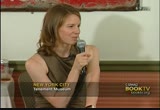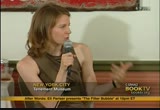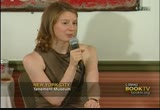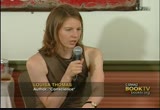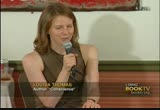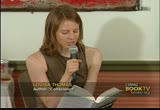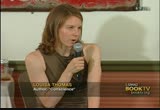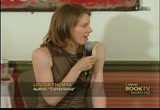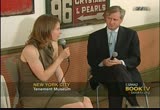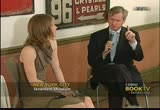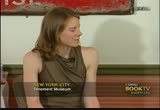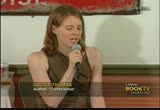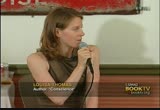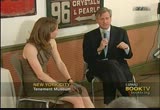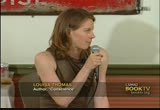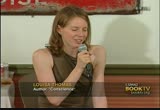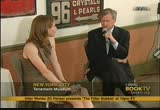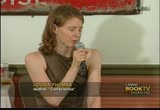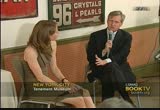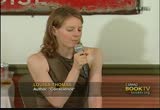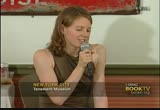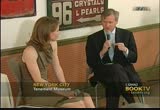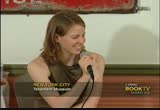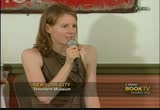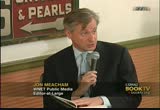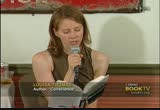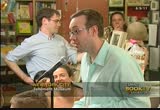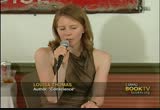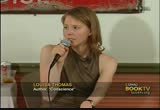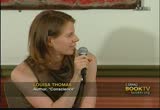tv Book TV CSPAN July 3, 2011 9:15am-10:00am EDT
9:15 am
research team i put together for "cutting the fuse" were absolutely instrumental. because you see, "cutting the fuse" examined over 2200 suicide attacks. it looks as a whole variety of patterns to try to test the assumptions underneath this argument. a whole variety of cases. one person simply can't do all of that. and i have to tell you, jim feldman, he goes by came, he is part of the most brilliant military officer i've ever run into. and i think that you just simply a fantastic partner for this book. >> robert pape is co-author of "cutting the fuse: the explosion of global suicide terrorism & how to stop it." published by the university of chicago press. >> thank you, peter. >> next on book tv at the tenement museum in new york city, louisa thomas recounts the life of her great grandfather and his three brothers during world war i.
9:16 am
>> louisa thomas is of course the great granddaughter of norman thomas, who ran for president in six consecutive elections on the socialistic ticket. he was a protestant clergyman and as she explains he offered as a tenement houses of immigrant families. while his focus was often in east home from hi his experience may have been very similar had his focus on the lower east side. norman thomas dreamed of greed and integrate harmonious new york not entirely broken down by race and nationality. i imagine he would've been heartened by the families live in our tenement across the street. we have a recording of a sicilian catholic women who remembers as a girl she lived next-door to lithuanian jewish family. on the sabbath she recalls they would call for young josephine to turn the light on for her. 60 years lives you could still share the pride in her voice for being called upon for that task.
9:17 am
it is entirely probable that families living in our tenement which is open until the year 1935 discuss or admired norman thomas. tonight we are pleased to discuss his life and work with louisa thomas, the author of "conscience." shall be signing copies of the book after the talk. keep in mind when you buy a talk topic on your supporting the published, the author, and the museum. tonight's conversation is led by john beauchamp, executive vice but at random house. a former editor of "newsweek" and because of prize-winning america. contribute to the pbs television newsmagazine need to know. after the conversation you have an opportunity to ask questions. since the recording device presentation on book tv, you have to ask your questions from the microphone right to. we won't be able to accept questions from your seat.
9:18 am
but now please join me in welcoming our guest. [applause] >> i love this. thanks. thank you all very much. of the city. you're a lot about even in the american south where i come from. and it actually, they are struck that not everything is a tenement. so they can come and look and see what it used to be like, but thank you for your hospitality. and congratulations to louisa who has written a i think wonderful book, a deeply researched and engagingly written account of her own family, which is not always an easy thing to do. and want to start with some
9:19 am
specific questions, and then we're going to read a couple of things, then go be a little socialist jeopardy to keep her going. but we will start with why this book now? >> this book is, as you mentioned, a family store but it's also a story about an american family at a time of war and a time when the country is going through some major cultural, political, economic and social of evil. -- social of people. it looks more like it does today, you know, at the end of world war i then did at the beginning. during the war -- when world war i began most americans, most americans contact with our government was going to the post office. four years later, fast forward
9:20 am
to 1914, 1970 have been from the interstate interest the war. suddenly millions of men are being drafted, millions of men see their government working, and women, too, for the government in a much different way. and they were forced to reckon with questions about what is a citizens obligation to this country, what a brothers obligation is to another brother, what sons and daughters obligations to the parents are, and brady had they had in 20 years before. of course these questions just arise on a day. there were plans within a few decades that come before. i think it's hard for us to realize just how striking where the changes. at the beginning of 20th century. but at the same time, you know, we face these questions all the
9:21 am
time. we are also a country at war. we are also debating these questions of, to what extent should we be committing our resources and our citizens lives, and our money and our time and our faith. not only to the government but citizens. and so i think that's a perennial question. and the way, because the change is so extreme in the transition was so violent literally and figuratively, they had to reckon with these questions in a way that i think really brought them to the floor. and looking at the way they did that i think that we can see, you know, how the question still live in our own lives spinning so when you think about the era, really from tr through wilson,
9:22 am
start of the turn of century, evermore rapid industrializati industrialization, a nation progressive movement that gets social legislation that is ratified and increased by the new deal and endures in some form until this our, you have as you say a selective service system that actually engaged the broader population when conflict came up. would you say that that might be the most striking difference in terms of the issue that all four of these brothers involved, was not as though today we get to choose whether or not we are interested in serving. then it was not so much choice, and you are confronted much more directly with a conscientious decision. do you fight, do not fight? do you find alternative ways to serve? is the cause of just?
9:23 am
do you think that these brothers, given some other choice, sort of out of the context would have dealt with the same issues? >> i think that's an excellent the fact that draft did exist in that time was certainly something that forced reckon with the conflict, where some people simply do not have to today. i mean, i never, i never once wondered if i was going to have and i was born well after it's not just something that mind. required a kind of engagement that surpassed even what they
9:24 am
had to do at the time. norman thomas for example, didn't have to fight. he was older than the draft age. he was a clergyman which would've also making xm. he had a large family who was dependent on him. he didn't have to engage in some should be doing what it was doing. he chose to. but he chose to because so many people didn't have a choice. and he thought that there was some things, something odd about that. even the phrase selective service is an interesting story about this decision to call the selective service. when the united states went to war there was some debate over whether or not there was a draft -- us in the of whether not there were soldiers, an amazing story even after the war of declaration when a congressman, you know, some military officers
9:25 am
went before congress on what resources they will have to command, and then the the congressman does my god, you're not wanting soldiers, are you? nobody corrected him. anand in april, everybody was passing -- you know, was talking about, was rejecting the draft as a measure. there was a man named george creel who is a journalist, who will soon come his one of the first people wilson called after the decision to go to war. and he set up an organization called the committee on public information, and is basically a propaganda arm. he was brilliant. >> he sounds like one.
9:26 am
>> and one of the things that he ended up doing was calling it selected service, because selective, you know, appeals to the kind of sense of the late. service, suggests oversight. and wilson as he gave a speech early on when he announced a draft pick he said in no way, no way a conscription unwilling. it is rather, i think, i don't know the exact phrase, but rather, you know, the decision have volunteered and asked. >> right. [inaudible] when they decide to implement the draft, they put up posters that have free choice. you can enlist, join a group which we called up later, or you will be, you will be deemed to have been enlisted.
9:27 am
[laughter] >> they always will in england. let's talk about the brothers. put them in context at the beginning of your story. who are they, where are the, what's going on? >> there are four thomas brothers. norman thomas is the oldest. all brothers went to princeton. they left, actually had pretty much the same background. they were the son of a presbyterian minister who is pretty conservative in his ways, although very much widespread progressive ethos the hell times were getting better. norman went to princeton what he loves to be. he knew woodrow wilson there. as college president and professor. took every class he could with woodrow wilson. afterwards he became a minister. he actually went to work in the tenements and spring streets right across the island where he was exposed to some pretty extreme degradation or although that's not really what ratified
9:28 am
him. that was very much, does it -- help basically the point of christianity was not just to enter heaven but to establish a kingdom of god on earth. and this was very much mainline protestant thinking. so, tons of young men coming out, you know, you know, the kind of middle-class, sort of thought that they were obligated to try and make the world a better place. he goes to the seminary, which is pretty liberal seminary. and then he goes to work at a very fancy church on fifth avenue, social life, looks like his head towards living a very comfortable life. and he and his wife decide to
9:29 am
move to east harlem and work in the tenements there with mostly italians and hungarians. those were the two largest immigrant populations. new york at that time, the country is is coming off of, you know, explosion of immigrants that come to the country. i think a third of the 92 or so million people were first or second generation americans. and that's when you started to see the way the country was organized. things changed. he started down that path. routh, the second brother, also went to princeton. he became a engineer, quite conservative, very happy to live a good life and be fair to
9:30 am
others, and you know, he was also very -- when the war began he enlisted right away and became a captain in the army. edwin thomas, the third brother was much more tortured. he saw that there were -- he looked around and he saw this kind of liberal questions tended to make, you know, were not doing anything. there was a lot of hypocritical self-satisfaction and all. he asked ago when the war broke out in europe, which is that in scotland. , came back over to be a conscientious objector when united states was at war. and consulate had to push the boundary of what was acceptable
9:31 am
in order to show he was being true to himself and true to his principle and fighting for principles. and then the youngest, arthur, was a lot less sure of what to do. struggled at princeton, kind of didn't do what he wanted to do, thought about opening a part of them thought about being a missionary. >> with three mighty oaks in front of you -- >> exactly. why do you think there's no place in princeton for a boy such as you? and he was not so sure the world was a good idea, he was also not ready to go to prison to protest. he was a lot more like most of us. >> and there must have been a mother. >> there was. she was pretty extraordinary.
9:32 am
she had her own pretty extraordinary path. she had grown up daughter of missionaries, and then her father, then the first present of the all white colleges of reconstruction in the south here but then she got on to marry a minister and had a very conventional life in ohio, big brood of kids. involved in church causes but she was part of one of, she was maybe the most interesting person to me in some ways because she really struggled to negotiate between her children, even as her views were being challenged. >> so talk about norman and walkers through the real crises the brothers faced as a question of service was engaged. >> norman became a pacifist in the 1960s, or right before the
9:33 am
united states entered the war and he became involved in some organizations, antiwar organizations. that was sort of the very structure that would become the aclu after the war. [inaudible] he sort of started working, they went through political channels and also kind of grassroots organizations. and evan didn't believe in politics. and he just wanted -- he had kind of a martyr streak. he decided to come back to the united states and take a stand. ralph really heated wilson's call for a fight for freedom and are the kind of what whether this or whether to become an
9:34 am
officer. ended up he wanted to become a fighter pilot. [inaudible] >> arthur was my favorite. [laughter] i identify the most with him. i want you to read this paragraph. >> constants can be problematic notion. it's hard to say just what it is and it's easy to conceal from danger to a can make a person who suffers got a can be used to justify any action, even heinous ones. a group of right wing germans. they can encourage egotism, bemoaning of hamlet or full speech. they can encourage intolerance
9:35 am
our conflict with responsibility, which sometimes doing what is possible if not it is right. >> how did that wonderful definition of conscience play out for norman? >> you know it's funny, after norman had established himself as the leader of the socialist party and run for president a bunch of times, a sociologist named daniel bell wrote an essay about income are wrote a book in which include a discussion of norman. and there is kind of famous distinction between ethics and responsibility and the ethics of concert he said the problem is he lived his life according on he felt the stay should have an ethics conscience. actually don't think that's fair. i think he was much more alert to the kind of compromises that a government is supposed to make, and i think that the story
9:36 am
of the brothers does illustrate the limits and dangers of thinking too much about, you know, how to be for yourself, you know, what obligations you have to other people. and that was something that norman was really -- right after evan it got on a hunger strike to protest the drive, he wrote evan a letter and said no man -- the real challenge is to live among other people. and to fight for my domain, to make sure they have the kind of opportunities that you have, so that they can be true to themselves. he basically had, he was coming out of, you know, a protestant background in which, you know, the sermon of about what sort of of the ultimate statement.
9:37 am
so it's always a but aussie act. how do you -- the way they sort of dealt with the, they talk about freedom of conscience. so the idea of freedom of conscious is that everybody, everybody has the freedom. you can't be a not see basically. they could never solve some of the problems that they face, but they thought you had to engage them. >> so would norman's legacy be the persistence of a culture of freedom of conscience? or is it more specifically one toward what we would think of as nonviolence and curettage and attempting to make gentle the life of this world? it's really avoiding violence at all costs.
9:38 am
>> i -- >> at all costs, and am going to go back to the. >> normative not remain a pacifist as always. but i don't see why you also have to make, i don't think it's an easy content either or statement. i think it meant in part a repudiation of violence. because what is, what is force is not imposing your will on another. >> there is defense. >> there is defense, too. >> that whole world war ii thi thing. >> i also think that, yeah, i think, he was involved in a number of nuclear disarmament, a number of causes that i would hope --
9:39 am
[inaudible] >> and he became come his pacifism was defended after pearl harbor.(z >> i mean, sort of thought it was a moot point at that point. it's sort of a different situation. he had seen too much of kind of ugly leaders, not just here, fascism in this country. and he worried that in light of the great depression, in light of some of the things he saw that war in this country would lead to fascism here. i mean coming we sort of hear that and can't believe, this is the greatest generation. fascism would never occur here. but he worried about that. >> now, the one story i grew up knowing about norman thomas isg
9:40 am
probably a pocketful, but involves conversation with franklin roosevelt. you want to tell the story?xw[? >> sure.[ó[ó[w[w >> you knew this was coming. >> i knew this was coming.[ó[ó[ so, one of norman's causes in[ów the 1930s was he was working on behalf of sharecroppers inóxw the south who were being[[ó[w murdered, lynched, and[ó[ó unbelievable things are happening to[w them. they couldn't meet in groups. there were drive-by shootings and unbelievable situations. and when they tried to unionize, it got much, much worse. and he had gone down to the south and had been driven out of town by mentoring shotguns and all thing. he wrote letter after letter saying you've got to do something of you've got to do something. he gets to the meeting at the white house andy seth mr. rose welcome you got to do something.
9:41 am
this is unconscionable. and roosevelt looks across the desk and goes, do you know what, norman? i'm a damn fine better politician than you are. i know these people, and people are doing good work down the and it's just going to take some time. and norman was saying can't wait. in a way this is, this is what the response of some pacifists would say. you can't wait. you can't let this go on. that was his response to what was going on in the south. ultimately, you know, things did change and it did take a lot of time, but you could say like, maybe when the social climate for economic climate would allow roosevelt or the national guard to way things. maybe you need to wait third
9:42 am
sheet -- 30 years. >> one of the things that fdr's own social conscience was awakened when eleanor brought him to new york to come and in so far as he was able to project, those values domestically, how do you, where do you come out on the issue of the limits of politics but the demands of justice? because no one would argue now that, because of the failures of reconstruction, jim crow, because of the robber barons of the north, the economic depression, that many, many social reform should have been earlier, many, many social reforms should happen right now, will not because there's another man in the white house called the bully.
9:43 am
that tends to be an occupational hazard for people behind that desk. we're just this come out? is there a tragedy of history or his mo or individuals to make specifics? >> well, all in all, eleanor herself like to see if she weren't married to the man in the white house she would be married to a norman thomas. i think she was one of the individuals who made a difference actually. and i think fdr was, too. and maybe norman thomas was, too. if she was right, that she was part of, he was pushing her and she was pushing him. i think it's much more than, you know, you can never point to someone and say there's the difference. but i do think that politics is messy and it makes painful
9:44 am
compromises all the time. you know, nothing works according to plan, and everything has its limits. i think evan thomas, at one point got in a fight with norm. don't you understand that the state has to respond, the state is going to respond, the president and democracy over responsibility, you know, act ii popular majority. your moves are modeled by this. and norman wrote back we are not levelheaded. we are doing all sorts of things. you know, do i think that norman was an effective socialist? or ineffective politician? i think he was a damn sight
9:45 am
better politician the norm. do i think there was a place for norman in the american political sentiment? yes, actually. i think they should be maybe more of those? i think so. i think that the health of the democracy required the kind of open exchange of ideas. and the kind of thoughts that norman and his friends during world war ii about du reform from inside or outside, do you, what is the best way to get your plan across, your message across to do justice? >> that's a question i want to ask you about, generational responsibility. do you think that your great-grandfathers generation, did the media and political
9:46 am
landscape give him a bigger voice as a socialist candidate, as a figure, almost always event, then we currently are able, for whatever reason, to give voices outside? or dead, you know, your generation, created this thing called the internet. and is that going to open this up? >> well, i mean, the internet is opening up and also drawing it out. it's hard. i do think that, you know, the american political system doesn't allow for third party very easily. it actually did a little bit more so a norman stein because
9:47 am
socialism -- in a norman stein because socialism was a viable idea in 1912. now they would call himself a specialist, you know, you would be considered evil or a nazi or whatever spent or the recipient of the wall street bailout. >> or the recipient of a wall street bailout. so i think there's a little bit more generational complacency than there was in his generation. maybe because we don't have to go to war. maybe because it was just a smaller world. you could get access to the president. he knew reporters. it was just easier. >> it was smaller, but we now
9:48 am
know, we now have things you don't want now, certain have a tendency. why isn't there in this highly educated, highly influenced, a higher level of social engagement in a way that we would recognize as a dimension level? >> i've heard people say that there is more than, you know, more than meets the eye. i think that you can make the argument that people are involved in kind of community projects, you know, to a degree that is, you know, i mean, they might not be interested in going into politics but their interest in starting companies that might have renewable energy impacts or things like that.
9:49 am
which i sort of like social ends. i think that the era, one of your earlier questions, is part of the entry, it's not a kind of demand upon my generation. that there once was. there's no draft. there's not, not very much is accurate in a way we're sort of reverting back to your only interaction with the federal government is the post office, the d&d. >> your passport. >> yes. i don't think -- i'm not saying we should have a draft again. spent i think we should. >> that's an interesting debate, i thing. i think there is compelling arguments to be made for a. i think that, you know, we ask a
9:50 am
lot of our servicemen, and i think that, you know, the recruitment process is kind of gnarly. you know, i think that there should be more equitable sacrifices made across populations. >> reading the book i kept coming back to here are these brothers, and they call it thoroughly engaged electrifying political time, rejection of force, a president who had trouble with congress but managed to spend civil liberties and get his way, sounds somewhat familiar, but one difference that kept coming back to my mind was, because there is not a draft, because there is not the
9:51 am
possibility that the upper-middle-class can be in harm's way, then it all becomes like the academic. i just submit that if we had approaches of vietnam's era draft with all the exceptions we serve nicely, at home, militarily, all that here if that happens, is there anyone who possibly please that would we still be in afghanistan? >> i think this is a debate we can actually have because i think you can make an argument for a. at the same time, it is a kind of academic question.sçç >> your great grandfather would say we have to have these mechanisms. >> we do. >> don't go playing fdr army.
9:52 am
>> -- fdr on me. >> i think that one of the g things to remember about these brothers and one of the reasonsg why i think looking at this m story is really valuable, they were really working out how to answer some of these questions. there was an urgency because they were new questions.@n they felt them. these are questions that we just don't feel. n you know, the kind of tension between your responsibilities as individuals, your responsibility as a citizen, ethics versus morality. these are all sound academic terms.a when he came down to it is likely going to die for your country? are you going -- is not as unequal.@n we had a huge structural problem in the country.@ i think our poverty rate among
9:53 am
children was around 22%, second to mexico. there is some really big things going on and there are not@ñ question that most of us wake up and think about. i certainly don't. and i don't have to. i'm lucky, to do, that i don't. like you do get to live my life and pursue my other duties, andc do what i want to do. that's not the case for everyo everyone. >> i think this up because i find the book compelling, this book raised these issues in a compelling and implicit place which is a very difficult thing to do. and i think anyone reading it now will find quite resonant everything that's going on and unfolding around the news now, and for ever.
9:54 am
i'm going to ask you to reduce and it will take questions from you all -- ask you to read this, and then we'll take questions questions from you all. >> right or wrong he loved his family. in 1941 while norman was still publicly speaking out against the united states entry into world war ii, his son, evan,ev volunteer to drive and lenses for the british. that's before he stepped out in november 1941, norman spent -- sent him a letter and a cruel and ugly world you may choices, you have chosen what is for you i'm sure the best possible course, he wrote. ó or that i can tell you i am a senior and loving you and wishing for the extreme good fortune and still more for the ó encourage. this by our follies, -- it will be a great happiness always to
9:55 am
carry your watch until you return to claim it.1ó have that watch no. it is remind him more than a father's love for his family and his more than a young man's desire to fight for freedom. it was his own. that lesson was learned long before. >> the book is "conscience." louisa thomas, thank you. [applause] >> now we have instructions, which you must follow conscientiously. >> so, people have questions they can come right up here for them. >> this gentleman has been taking notes. that's never a good sign. >> could you talk about norman's inspiration by john reed?
9:56 am
>> john reed, john reed is more, norman became a socialist in 1918. john reed, there was a russian revolution that happened in 1917. and john reed, like many liberals across the world, was0 hugely inspired by that. norman was, too. so was walter lippman, and so was woodrow wilson. woodrow wilson's words and he said basically -- i think norman became, norman was not kind of inspired by the utopian project as john reed was.1ó and didn't consider himself a marxist. in fact, when he applied for
9:57 am
socialist party wrote a long letter explaining why he was really kind of not totally for the socialist party. [inaudible] >> nonpartisan and i fear that the socialist party is not respectful of the social liberties. i'm not a marxist. he sent this letter off. he had not filled out the other side of the confirmation. so i think that he, i actually, if he knew john reed, i don't know. at this point in time. but certainly he knew people
9:58 am
like other socialist, you know, other people who were kind of part of that, part of that circle. john reed started, story is tragic in its own way. it's almost sort of following a different path. >> to what extent did the slaughter going on in your for the past three years, especially for evan event over in scotland, what was the influence which he and norman thought of with ralph and often? >> it was huge. world war i was unbelievable. 1.8 million germans, 1.7 million russians, one point dashed over
9:59 am
a million frenchmen, the death was just -- even in the u.s. about 50,000 paper with the fighting only lasted six monthsd they were losing like 820 men a day. that's just unbelievable. evan was over in scotland, and then also in london a little bit. and he thought, he saw what it is like. and also what it's like to be in london. but every men respond to violence and every culture response to violence to fully. ralph was actually wanted on the winter front. he remained, remain pr
122 Views
IN COLLECTIONS
CSPAN2 Television Archive
Television Archive  Television Archive News Search Service
Television Archive News Search Service 
Uploaded by TV Archive on

 Live Music Archive
Live Music Archive Librivox Free Audio
Librivox Free Audio Metropolitan Museum
Metropolitan Museum Cleveland Museum of Art
Cleveland Museum of Art Internet Arcade
Internet Arcade Console Living Room
Console Living Room Books to Borrow
Books to Borrow Open Library
Open Library TV News
TV News Understanding 9/11
Understanding 9/11